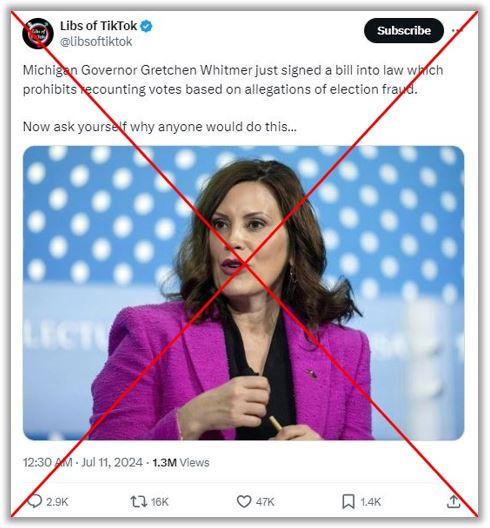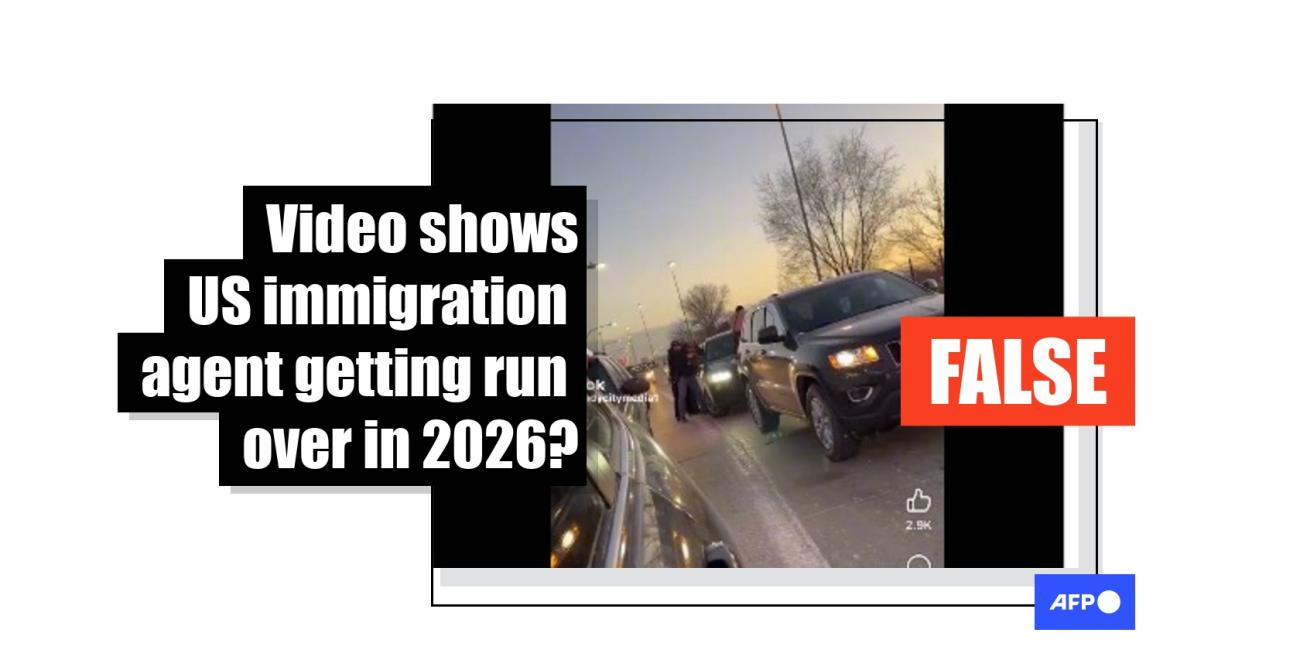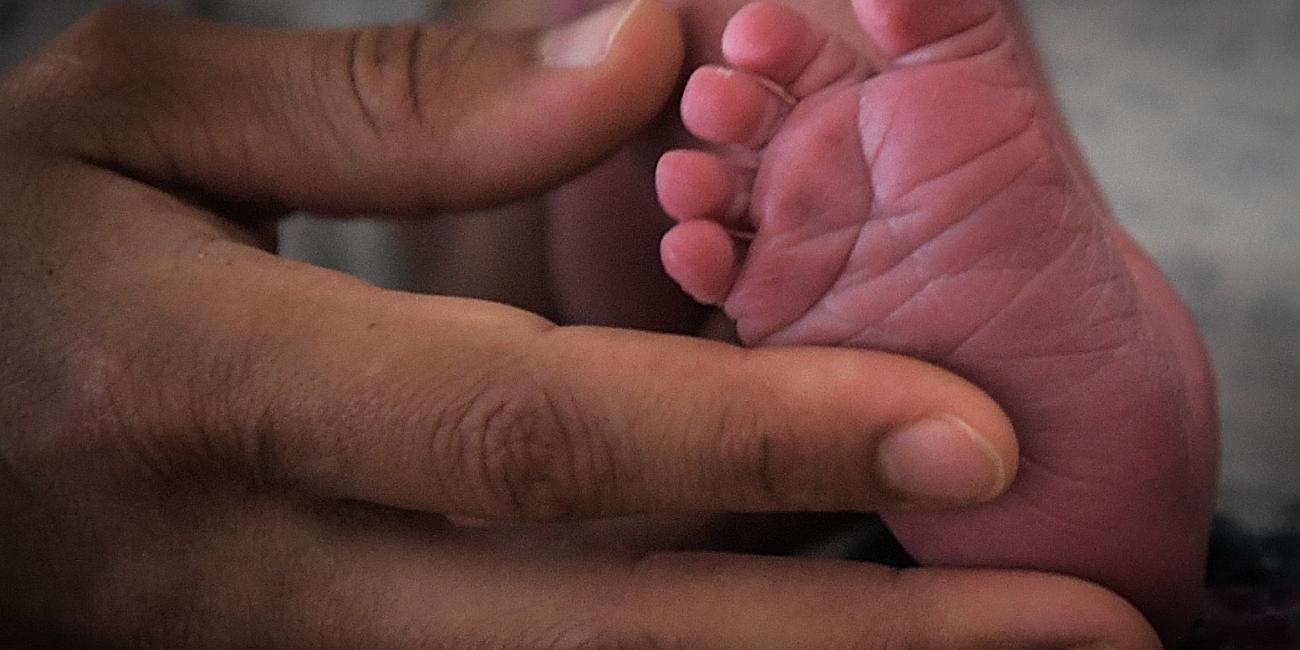
Michigan election recount law misrepresented online
- This article is more than one year old.
- Published on July 24, 2024 at 19:44
- 4 min read
- By Natalie WADE, AFP USA
"Michigan Governor Gretchen Whitmer just signed a bill into law which prohibits recounting votes based on allegations of election fraud. Now ask yourself why anyone would do this," says a July 11, 2024 X post from Libs of TikTok, a page that AFP has previously fact-checked for spreading anti-LGBTQ disinformation.

Similar posts referring to Senate Bill 603 (archived here), which Whitmer signed July 8, have circulated elsewhere on X and Facebook.
The legislation comes after Donald Trump and his allies filed a flurry of lawsuits seeking to overturn Michigan's results in the 2020 presidential election, when Joe Biden carried the state by about 150,000 votes. Officials conducted a statewide audit that affirmed the outcome (archived here).
SB 603 distinguishes recounts from fraud investigations and makes more voting precincts eligible to conduct them. The law also lowers thresholds for automatic recounts and increases the per-precinct deposit fee a petitioner must pay.
Republicans in the state House of Representatives have criticized the legislation, saying it may weaken existing protections (archived here and here).
"By making recounts too expensive, we are effectively pricing out local candidates from ensuring the accuracy of election results and diminishing the public’s confidence in the process," said Representative Ann Bollin in a June 20, 2024 press release (archived here).
But posts claiming the measure "prohibits recounting votes based on allegations of election fraud" are inaccurate.
"SB 603 was written to modernize the law to ensure that all ballots can be recounted," said state Senator Stephanie Chang, the legislation's Democratic sponsor (archived here), in a July 19 email.
The law permits candidates to request recounts if they believe errors or voter fraud affected the outcome of an election.
"With Senate Bill 603, the reasons for petitioning for a recount are not at all being narrowed; if anything, the law clarifies the broad range of reasons one could petition for a recount –- anything falling within the scope of an 'error,' rather than just 'fraud or mistake,'" Chang said.
"If someone believes there was fraud, they can petition for a recount, just like they could have in the past."
Quentin Turner, executive director of the voting rights group Common Cause Michigan (archived here), agreed.
"SB 603 helps clarify the distinction between recounts, which are handled by election administrators, and voter fraud investigations, which are handled by law enforcement like the attorney general," he said in a July 23 email.
AFP took a closer look at three key elements of the legislation.
'Out-of-balance' precincts
Before SB 603, Michigan voting precincts that were "out of balance" -- when the number of voters listed in a poll book does not match the number of submitted ballots -- were disqualified from participating in recounts.
This rule prevented more than 7,000 votes from 33 precincts from being recounted in the 2017 Detroit city clerk election.
Chang said there are several reasons precincts may become out of balance, such as when a voter signs the poll book but does not submit their ballot. Sometimes the plastic seal on ballot boxes breaks, she said, which can also disqualify voting locations from recounts -- even if eyewitnesses confirm the equipment was not tampered with.
Whitmer's office said in a July 8, 2024 statement (archived here) that SB 603 "mandates that recounts will be allowed for precincts that have an imbalance between the ballots collected and ballots issued as long as they provide a satisfactory explanation and a sworn affidavit in a form prescribed by the secretary of state."
Recounts affecting results
The law does aim to prevent spurious recounts.
"In recent years in Michigan, we have seen losing parties issue frivolous recount attempts that served no purpose other than to sow distrust in our elections and undermine our democracy," Turner said.
"This bill helps stop frivolous attempts to maintain that Michigan elections are safe and secure. It does not prevent legitimate fraud investigations."
During the 2020 election, some Republican members of the Wayne County Board of Canvassers requested a recount of votes in several precincts that could not have affected the results.
In 2016, Green Party presidential candidate Jill Stein requested a recount of ballots in Michigan even though she received approximately one percent of the vote (archived here).
SB 603 says petitioners must now "be able to allege a good-faith belief that, but for error in the canvass or returns of the votes, the candidate would have a reasonable chance of winning the election."
In other words: "The number of votes requested to be recounted must, at minimum, be greater than the difference in votes between the petitioning candidate and the winning candidate."
Investigating fraud
SB 603 clarifies that the Board of State Canvassers, which conducts recounts, is not responsible for investigating fraud.
The law says a recount is an "administrative process limited to determining the number of votes cast on ballots," while voter fraud is a crime that should be reported to law enforcement.
Michigan Attorney General Dana Nessel and Secretary of State Jocelyn Benson said in a May 24, 2024 statement that canvassers do not have the authority to conduct investigations (archived here).
"Proper venues of recourse for individuals who have reviewed available election material and believe fraud occurred exist, which include contacting local law enforcement and/or filing a challenge through the courts," they said.
AFP has fact-checked other claims about US politics here.
Copyright © AFP 2017-2026. Any commercial use of this content requires a subscription. Click here to find out more.
Is there content that you would like AFP to fact-check? Get in touch.
Contact us




